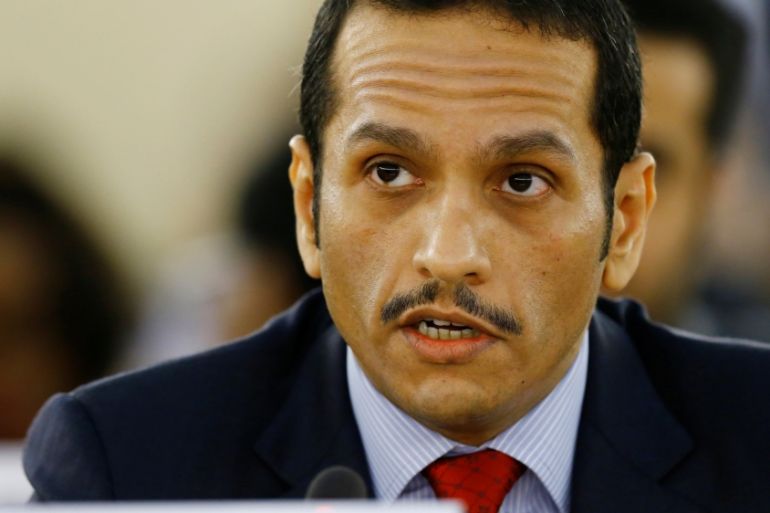Qatar calls for renewed push against ‘terror groups’
Qatar’s foreign minister says countries must not use fighting terror as an excuse to attack opponents.

London, United Kingdom – Qatar’s Foreign Minister Sheikh Mohammed bin Abdulrahman Al Thani has called on the international community to unite against groups like the Islamic State of Iraq and the Levant (ISIL, also known as ISIS).
Al Thani told the audience at the Westminster Counterterrorism Conference in London on Thursday that “it is time for the international community to say enough is enough”.
Keep reading
list of 4 itemsMoscow theatre attack suspects show signs of beating in court
Four men showing signs of severe beating charged over Moscow concert attack
Russia mourns Moscow concert hall attack victims as death toll rises to 137
The event organised by the prestigious Royal United Services Institute (RUSI) brought together former and current counterterror officials and other experts in the field.
According to Al Thani, Qatar is resolutely committed to ending extremism of all kinds and since 2004 had taken “aggressive” steps to cut the flow of finance to groups that have been designated terrorist organisations.
“Qatar wants constantly to seek new collective approaches to the global threat of terrorism in a changing world,” he said, before condemning neighbouring rulers in the region who had used terrorism as an excuse to persecute opponents.
‘Impulsive leadership’
Al Thani told Al Jazeera that the “impulsive leadership” of Saudi Arabia was behind its attempts to isolate Qatar and for the crisis in Lebanon, whose Prime Minister Saad Hariri had purportedly been forced to resign by the Saudis.
“I must emphasise the role of the rule of law and due process, because one of the main reasons terrorism flourishes is the absence of justice,” Sheikh Mohammed bin Abdulrahman told the conference.
“We should not allow governments to disrespect the rule of law and due process and use terrorism as an excuse for persecuting their political opponents.”
Dr Mutlaq Majed Al Qahtani, Qatar’s special envoy for counterterrorism, said no country was immune to what is now a global problem, making partnerships essential in the battle against extremism.
There are some countries, some politicians, some leaders, that are also using this concept to demonise, or victimise, or just attack their opponents
However, he said conflicts in countries such as Syria, Yemen and Somalia fuelled by the “adventurism” of some countries were exacerbating the political, legal and intelligence challenges that were obstructing cooperation in tackling terrorism.
“There are some countries, some politicians, some leaders, that are also using this concept to demonise, or victimise, or just attack their opponents.”
Calling for the agreement of a comprehensive international convention on counterterrorism to address these challenges, Al Qahtani called for the creation of a “coalition of coalitions” to consolidate a global response to terror.
Analysts at the event warned that while ISIL has suffered significant setbacks in Iraq and Syria in recent months, the group still posed a potent threat to security.
Dr Shiraz Maher, an expert on radicalisation at King’s College London, warned against the assumption that ISIL had been defeated in Syria.
He suggested that the organisation could return in some form to tap once again into the popular grievances that had sparked its acts in the first place.
“The sense of vulnerability, of insecurity, has only deepened with time, and to an extent our own involvement in this military campaign against ISIS by pummelling Raqqa has helped to deepen a crisis that will precisely provide ISIS with the narrative, the conditions, it would seek to exploit again in another year or two in order to come back,” said Maher.
Franz-Michael Mellbin, the European Union’s special representative to Afghanistan, warned about “spillover” of defeated ISIL fighters from Syria and Iraq into Afghanistan.
“One of the very important lessons we need to learn from the Afghan context is that we prepare too little for when terrorism ends,” he said.
“This lack of preparedness we can see also in the post-Iraq/Syria situation.”
Mellbin added that it was well known which states sponsored terrorism as a tool to further their foreign policy objectives.
“We need to find a way to convince these actors that there are alternative ways, more legitimate ways, to achieve their foreign policy objectives,” he said.
|
|